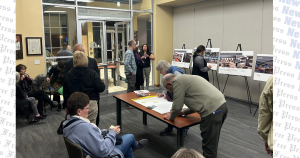By Anna Herod
Residents who voiced concerns after the Kyle City Council entered into a memorandum of understanding (MOU) with Vigilant Solutions to integrate license plate reading (LPR) technology onto law enforcement vehicles may be at ease.
Council members voted 6-1, with councilman David Wilson opposing the action, to rescind its agreement with Vigilant Solutions.
The dissolution of the agreement came after citizens and council members questioned the safety of the data collected by the LPR technology.
Joseph Harzewski, vice president of Vigilant Solutions and founder of the LPR technology, tried to quiet council’s concerns.
“Today the LPR technology that we developed has a national sharing element to it that is strictly related to law enforcement only,” Harzewski said. “The way that we specifically structure our technology is based on ownership. Everything happens by the City of Kyle’s discretion, 100 percent.”
Harzewski explained the company’s municipal clients often opt to take part in the national sharing element of LPR technology.
This meant if Kyle were to have moved forward with the agreement, city officials could have chosen to share data collected through the LPR technology with surrounding police departments.
Harzewski pointed out that the City of Austin is a Vigilant Solutions client. He said if Kyle officials were to move forward with the agreement, the two departments could share data they collect with one another.
This would give each department the capability to detect both Kyle and Austin citizens with outstanding warrants, using LPR technology.
But Mayor Pro Tem David Wilson asked Harzewski what would happen to data collected on a person if they did not prove to have an existing warrant. Wilson also asked if a person’s arrest information would be stored in the database even if they didn’t have a warrant.
Harzewski said even the information of those with outstanding warrants would be stored into a database if their license plate was detected with the technology.
He said, however, city officials could delete the information at any time. They could set a “retention period” where the information is automatically deleted after a certain number of days.
“I am very passionate about this,” Harzewski said. “The reason that we came out with this warrant redemption program was to continue to give the city a benefit where they didn’t have to reach into already strained financial budgets… Let’s not forget the sheer, and raw core goal of what we’re trying to accomplish.”
Dist. 6 council member Daphne Tenorio said LPR technology made her uncomfortable. Tenorio motioned to rescind the agreement and was seconded by Shane Arabie, dist. 3 council member.
“It’s a little too big brother-ish for me,” Tenorio said. “And it’s a little too invasive for me. I’m uncomfortable with it, and for me personally I can’t justify it.”










